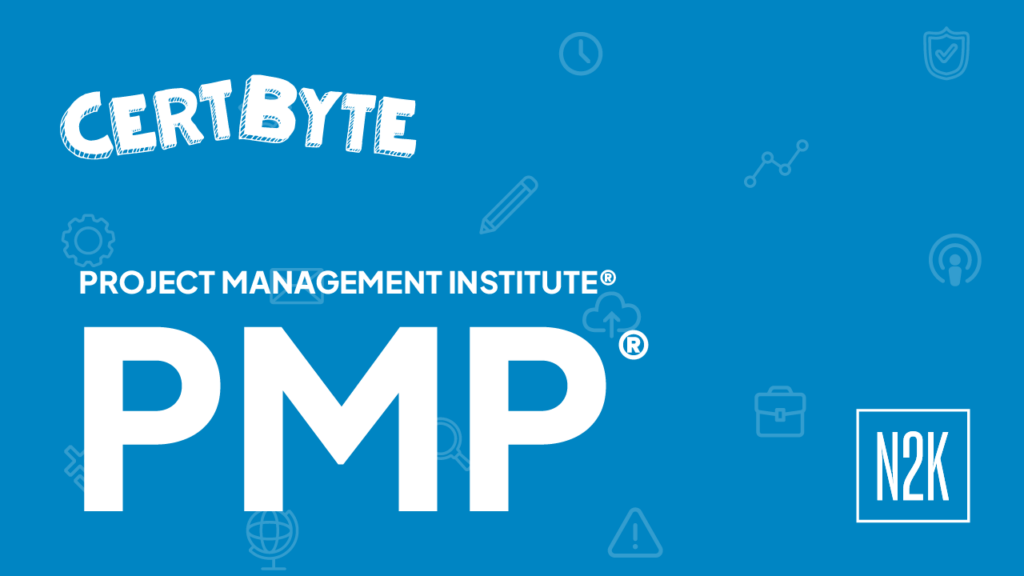Written by Chris Hare
On this edition of CertByte, we discuss a question from N2K’s Project Management Professional (PMP)® practice test.
As your news-to-knowledge partner, N2K strives to advance your professional growth while bringing you the industry news and trends that help you stay a step ahead. We recently launched CertByte, our new bi-weekly segment on the CyberWire Daily podcast, and these companion articles to support your certification journey and fast-track your career growth in IT, cybersecurity, and project management. As your host, I’ll share a practice question from N2K’s suite of industry-leading content and a study tip to increase your confidence and readiness on exam day.
In this segment, I’m joined by my teammate George Monsalvatge to break down a question from the Project Management Institute’sⓇ Project Management Professional (PMP)Ⓡ exam. For a bit of background, the PMPⓇ is well-known as the global gold standard certification in project management, typically targeted for candidates possessing approximately three to five years of project management experience. The question I posed to George is a sample from N2K’s PMPⓇ practice test*, and not from the actual PMPⓇ exam. It also reflects the seventh edition, which came out in August of 2021.
Quick PMP® study tip
When you sit for the PMP® exam, make sure to do a formula dump on your scratch paper once you sit down at your testing site. This is a huge advantage and a great resource reference often during the test. The PMP exam is notoriously long–almost four hours (230 minutes to be exact) – so another tip is to try to go through a set of practice test questions over four hours, so that you are prepared for the actual exam length.
This week’s question
Your project team is due to submit a deliverable today and you discover a defect in it. You’re aware that your customer does not have enough technical knowledge to notice this defect. The deliverable technically meets the contract requirements but would fail the fitness to use condition, which means basically it does not meet its intended purpose. What should be done next?
Answer choices:
A. Inform the customer that the delivery will be late.
B. Document the matter in the lessons learned for future use.
C. Deliver the deliverable, get the formal acceptance, and keep quiet.
D. Discuss the matter with your customer.
For a bit of context, this question tests a candidate on PMI’sⓇ Code of Ethics and Professional Conduct (which is a separate document from the PMBOKⓇ Guide), the acronym of which stands for the Project Management Book of Knowledge.
Working through the logic of each answer choice
Given this background, George worked through the logic of each answer choice and rationalized that “discussing the matter with your customer” is the best approach, especially compared to the others. The first choice, which is to “inform the customer that the delivery will be late,” may be part of the discussion anyway, so this one is ruled out. It also is phrased as a one-way directive rather than a conversation. The other option regarding “documenting the matter in lessons learned” is going to have to be done, but at a later point. The final remaining choice to “deliver the deliverable anyway and keep quiet” may end up in a lawsuit. In the end, George stuck with his answer of “discuss the matter with your customer.”
George was indeed correct; this matter should be discussed with your customer. According to the PMI’sⓇ Code of Ethics and Professional Conduct, the project manager should first and foremost protect the best interests of the stakeholders (which includes customers) and be honest with them about the true status of the project at all times.
Want more help with this exam?
Whether you are actively studying for the PMPⓇ, or would like to suggest a future certification question, email us at certbyte at n2k.com.
Premium certification prep tools.
If you’re studying for an IT, cybersecurity, or project management certification exam, check out N2K’s full exam prep library of certification practice tests, practice labs, and training courses by visiting our website at n2k.com/certify. To get the full news-to-knowledge experience, learn more about our N2K Pro subscription at thecyberwire.com/pro.
Explore key terms from the Project Management Professional (PMP)Ⓡ certification
Visit N2K CyberWire’s glossary to dive deeper into these key terms: PMIⓇ, PMPⓇ, PMBOKⓇ Guide, deliverable, fitness to use, lessons learned, Code of Ethics and Professional Conduct, stakeholders.
Happy certifying!
*For sources and citations for this practice question, please check out our show notes.

